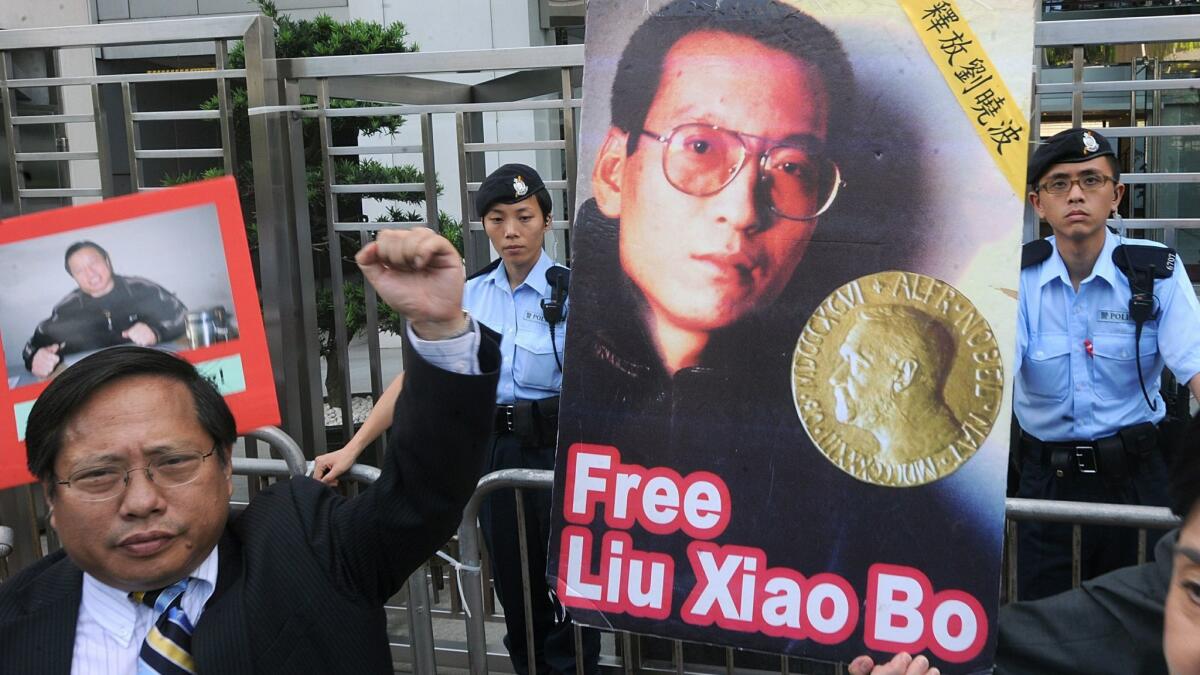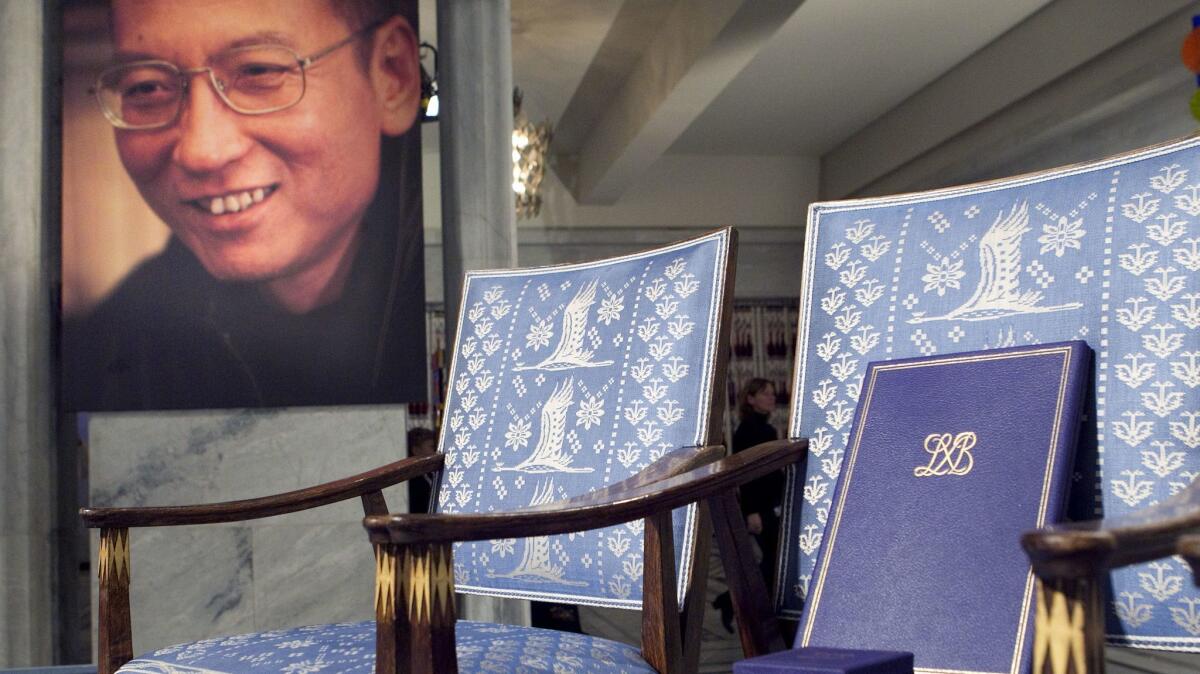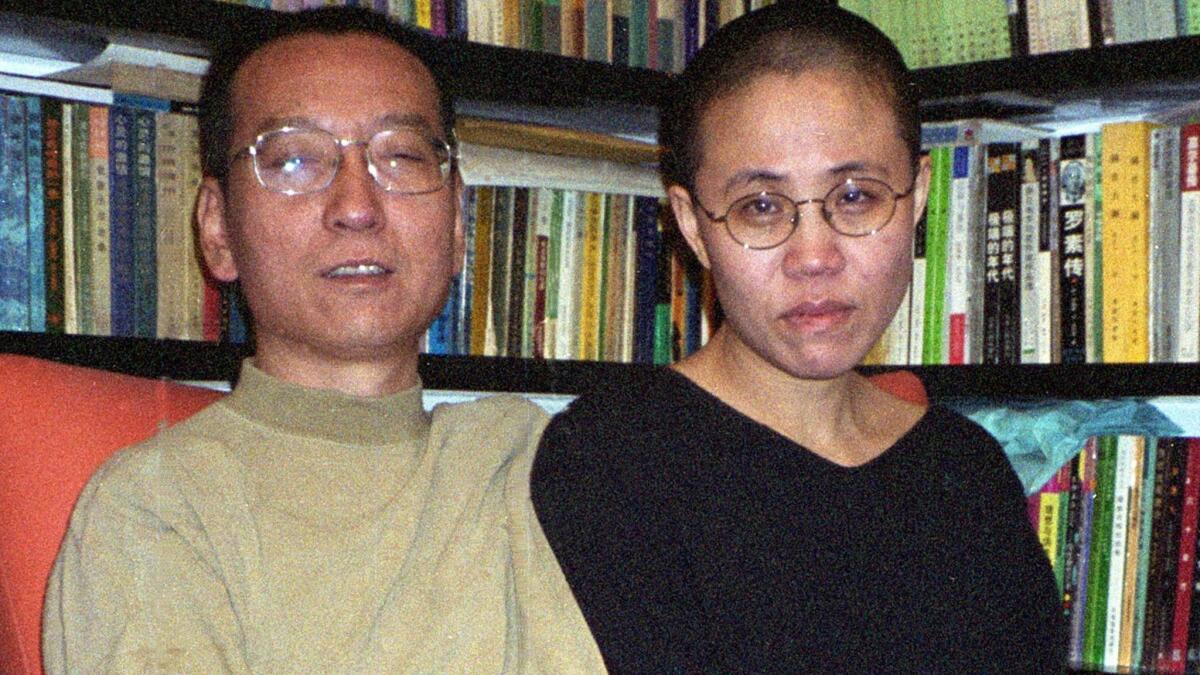Nobel laureate and Chinese dissident Liu Xiaobo dies at 61

When Liu won the Nobel Peace Prize in 2010, the committee saluted his “long and nonviolent struggle for fundamental human rights in China.” (July 13, 2017)
- Share via
Reporting from Beijing — Liu Xiaobo, the famed Chinese dissident who won the Nobel Peace Prize while jailed for his pro-democracy writings, has died in a hospital in northeastern China at the age of 61.
The Chinese judicial bureau said Liu died Thursday of multiple organ failure. Liu had terminal liver cancer and had been granted parole in June after his diagnosis but remained under virtual house arrest.
A prominent champion of democracy, free expression and constitutionalism since the 1989 Tiananmen Square massacre, Liu had been jailed four times and — when freed last month — was eight years into an 11-year sentence for “inciting subversion of state power.” When Liu won the Nobel Peace Prize in 2010, the committee saluted his “long and nonviolent struggle for fundamental human rights in China.”
World leaders praised Liu as a freedom fighter and towering symbol of human rights. In Hong Kong, pro-democracy activists gathered outside the Chinese central government offices to mourn the death of the country’s most prominent political prisoner.
Secretary of State Rex Tillerson called on China to release Liu’s wife from house arrest and permit her to leave the country. Liu Xia has been under house arrest since her husband was imprisoned.
“Mr. Liu dedicated his life to the betterment of his country and humankind, and to the pursuit of justice and liberty,” Tillerson said in a statement. He said that Liu embodied the very core of the Nobel Peace Prize he was awarded but never actually received.
Chinese authorities barred Liu’s family and closest friends from attending the Nobel ceremony in Norway’s Oslo City Hall; for many of them, detentions, threats and intimidation were, and continue to be, a feature of daily life.
“This fact alone shows that the award was necessary and appropriate,” said Nobel committee chairman Thorbjorn Jagland when the award was presented in 2010. Liu’s medal and diploma were placed on an empty chair.
It was the first time a Nobel Peace Prize was awarded under such circumstances since 1936, when Nazi Germany barred German journalist Carl von Ossietzky from traveling to Oslo to claim the prize. Among Chinese free-thinkers, the empty chair — and Liu himself — stood as symbols of resistance.

Chinese authorities released Liu on medical parole in late June after he was diagnosed with terminal liver cancer. He received treatment in northeastern China, over the objections of his supporters who submitted a petition requesting that Liu be allowed to travel abroad for treatment. His final days were spent under virtual lockdown, with only his doctors, brothers and his wife, Liu Xia, permitted to see him.
Liu was born Dec. 28, 1955, in Changchun, a city in northeastern China. His father was regarded as an intellectual who in 1969 — at the height of Mao’s Cultural Revolution — was sent to work in the countryside. After graduating from middle school, Liu worked on a farm before being admitted to Jilin University, where he studied Chinese literature and created a poetry group. He later earned a graduate degree from Beijing Normal University and went on to teach.
Liu published his first book — a critique of Confucianism called “Criticism of the Choice: Dialogues with Li Zehou” — in 1987. It went on to become a bestseller. He received a PhD in 1988 and went on to be a visiting scholar at Columbia University in New York, the University of Oslo and the University of Hawaii.
Liu’s friends and supporters said that he had an extraordinarily diverse set of interests and influences — that he could talk authoritatively on everything from labor law to the cinematic work of film directors like Ingmar Bergman and Akira Kurosawa. He was particularly inspired by Vaclav Havel, the Czech writer and dissident who became the first president of the Czech Republic in 1993.

Hu Jia, an activist and dissident who had known Liu for more than a decade, said that he associated Liu as much with fearlessness as empathy — a kind, slow-talking man with an ironclad set of principles and an apartment full of books.
Liu returned to China during the 1989 Tiananmen Square pro-democracy movement; his fiery speeches made him a well-known figure among student demonstrators, and the protests swelled.
After the government declared martial law on May 20, 1989, he called for a hunger strike and helped broker a peaceful withdrawal from the square for thousands of students. Yet on June 4, the Chinese military moved in and crushed the movement, killing hundreds of demonstrators. Afterward, authorities arrested Liu for “counterrevolutionary propaganda and incitement” for his role in the demonstrations.
Though Liu had ample opportunity to take refuge abroad, he always returned to China and a recurring fate — prison.
Hao Jian, a professor at the Beijing Film Academy who had known Liu since the mid-1990s, said his friend was forged by two forces in his life: the Tiananmen massacre and his relationship with Liu Xia, a onetime experimental writer and photographer whose easy temperament served to smooth out Liu’s rough edges.
“In China, we say when two people have been married for a long time, they sort of grow alike,” he said. “Liu Xia is easygoing; Liu Xia is calm and collected. So through interactions with a personality like that, Liu Xiaobo became more calm, and he could do more in his work; he was able to give more constructive suggestions. He became practical. And he started to take more advice than he did before.”
Hao said Liu was unafraid of being in prison and that his time behind bars only served to deepen his empathy for ordinary people.
In 2008, Liu helped draft Charter 08, a manifesto demanding that China’s leaders adopt an independent legal system, freedom of association, separation of powers and other pillars of liberal democracy. In response, police arrested Liu and banned his publications. He was convicted of “inciting subversion of state power” and sentenced to 11 years in prison.
“Hatred can rot away at a person’s intelligence and conscience,” Liu said in a statement before his incarceration.
“Enemy mentality will poison the spirit of a nation, incite cruel mortal struggles, destroy a society’s tolerance and humanity and hinder a nation’s progress toward freedom and democracy. That is why I hope to be able to transcend my personal experiences as I look upon our nation’s development and social change, to counter the regime’s hostility with utmost goodwill, and to dispel hatred with love.”
Liu Xia was placed under house arrest when her husband was again imprisoned.
Perry Link, a professor at UC Riverside who translated Charter 08 into English and co-edited the book “No Enemies, No Hatred,” a collection of Liu’s essays, emphasized that Liu was only one of the authors of Charter 08.

Yet “he took the lead, by which I mean he advertised it — he went around to people and asked for their signatures. Then he took politically a very big step: He said he would sponsor the charter, that he’d take the rap, he’d take the political fall. And of course he did. I don’t think he thought he’d win a Nobel Prize for it.”
Beijing condemned Liu’s Nobel victory, sparking a diplomatic fallout between China and Norway. Domestically, censors virtually blacked out news of the award. Last year, Beijing normalized diplomatic relations with Oslo after a six-year freeze.
In 2010, Beijing’s high court rejected Liu’s request for an appeal, despite an international plea — including letters from 134 Nobel laureates — that Liu be freed.
Today, Liu remains enormously influential within China’s intellectual circles.
Link said that when Liu won the Nobel, it opened up the possibility of a different type of modern China.
“When he helped write the charter and got the Nobel Prize, for the ones who knew about those events, I think it was the first time since the [1949 Communist] Revolution that the idea of an alternate modern China was at least thinkable.”
But under President Xi Jinping, human rights groups contend the government has retreated and again is bringing down the hammer on social or political change by cracking down on pro-democracy activists, human rights attorneys and journalists.
Link said Liu had come to accept that change would come slowly.
“Even though the pall that Xi Jinping casts is pervasive and depressing, I don’t think anyone’s giving up,” he said. “I think it’s like asking a sick person to give up on life. The last thing you want to do is give up hope.”
Times staff writer Tracy Wilkinson contributed to this report.
ALSO
Cholera outbreak pushes war-ravaged Yemen to the brink of catastrophe
China sends forces to its first military base abroad, in Djibouti
Taiwan’s president is now less popular than Trump. Here’s why
When this broadcaster makes a rare appearance, North Koreans know it’s serious
UPDATES:
9:15 a.m.: This article was updated with reaction to Liu’s death.
This article was originally posted at 6:30 p.m.
More to Read
Start your day right
Sign up for Essential California for the L.A. Times biggest news, features and recommendations in your inbox six days a week.
You may occasionally receive promotional content from the Los Angeles Times.






